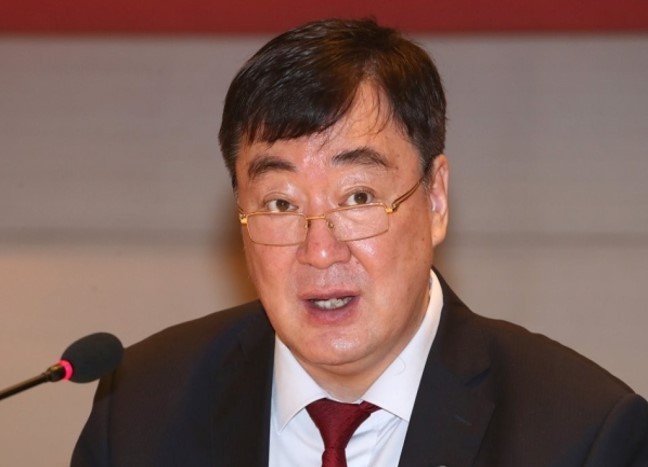Seoul, Beijing agree on fast-track system: ambassador
Korean entrepreneurs’ business sentiment in China lowest ever
By Shin Ji-hyePublished : April 28, 2020 - 13:56

With South Korean businesses in China suffering from low business sentiment and depressed sales amid the coronavirus pandemic, the Chinese ambassador to Korea said Tuesday that Seoul and Beijing had agreed on a fast-track system to guarantee efficient business travel between the two countries.
In a keynote speech at a meeting hosted by the Federation of Korean Industries, Chinese Ambassador Xing Haiming said Korea and China had agreed on the plan and that details of their consultations would be announced soon.
The meeting of around 20 representatives of companies doing business in China included Blackyak Chairman Kang Tae-sun, Daesang CEO Lim Jung-bae and Korea Line Corporation Vice Chairman Kim Chil-bong.
“We are seriously considering facilitating mutual visits so that Korean employees working in China can return and resume operations as soon as possible,” Xing said.
On March 28 the Chinese government imposed sweeping restrictions on foreigners entering the country. The country only accepts visa applications from people engaged in trade, science or technology in China or those who have urgent humanitarian reasons for traveling there.
FKI Vice Chairman Kwon Tae-shin said in the meeting, “The most common concern for China among Korean businessmen is the time to normalize Korea-China relations, which have been estranged since the Terminal High-Altitude Air Defense crisis in 2016.” He was referring to the economic fallout from the diplomatic conflict over the US-made missile system, which was deployed in Korea despite opposition from China.
“As Chinese President Xi Jinping is scheduled to visit South Korea this year, we hope that this will fully restore Seoul-Beijing relations.”
On Xi Jinping’s visit to Seoul, Xing said, “His visit to South Korea is a very important issue. Both China and Korea value this very much.”
Regarding the specific schedule for the visit, he said, “The two countries continue to consult through diplomatic channels so that he can come to Korea at an appropriate time.”
Xing also proposed ways for Korean and Chinese companies to cooperate in new industries.
“Our two countries must first strengthen cooperation in emerging industries and secure new momentum for the qualitative growth of bilateral trade relations,” he said.
The seven business areas mentioned in the proposal were 5G base station construction; high-pressure infrastructure; urban high-speed railway and urban railway transportation; new energy car-charging stations; big data centers; artificial intelligence; and industrial internet.
According to a joint survey recently released by the Korea Institute for Industrial Economics and Trade and the Korea Chamber of Commerce and Industry, the business sentiment index of Korean companies operating in China in the first quarter plunged to its lowest level ever due to the influence of COVID 19.
Nine out of 10 respondents said they were negatively affected by the pandemic due to export disruptions and weak consumption.
The business sentiment index for all companies plunged by 64 points on-quarter to 22 points for market conditions. For sales, the index plummeted by 73 points to 20 points. These are the lowest figures since 2015, when compilation of related statistics began. The baseline for the index is 100, with the maximum value being 200 and the minimum zero.
By Shin Ji-hye (shinjh@heraldocorp.com)







![[Graphic News] More Koreans say they plan long-distance trips this year](http://res.heraldm.com/phpwas/restmb_idxmake.php?idx=644&simg=/content/image/2024/04/17/20240417050828_0.gif&u=)
![[KH Explains] Hyundai's full hybrid edge to pay off amid slow transition to pure EVs](http://res.heraldm.com/phpwas/restmb_idxmake.php?idx=644&simg=/content/image/2024/04/18/20240418050645_0.jpg&u=20240419100350)






![[From the Scene] Monks, Buddhists hail return of remains of Buddhas](http://res.heraldm.com/phpwas/restmb_idxmake.php?idx=652&simg=/content/image/2024/04/19/20240419050617_0.jpg&u=20240419175937)

![[KH Explains] Hyundai's full hybrid edge to pay off amid slow transition to pure EVs](http://res.heraldm.com/phpwas/restmb_idxmake.php?idx=652&simg=/content/image/2024/04/18/20240418050645_0.jpg&u=20240419100350)

![[Today’s K-pop] Illit drops debut single remix](http://res.heraldm.com/phpwas/restmb_idxmake.php?idx=642&simg=/content/image/2024/04/19/20240419050612_0.jpg&u=)